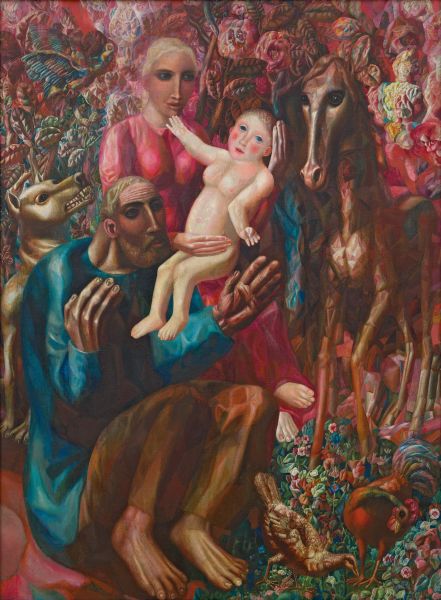|
|
Peasant Family (The Holy Family). 1914

Filonov Pavel,
Oil on canvas
159 x 128
State Russian Museum
Annotation
Pavel Filonov’s Peasant Family (The Holy Family) belongs to his Towards a Universal Blooming cycle of paintings. By the term “universal blooming”, the artist implied a single front that would reveal and realize common human values, with the spiritual role of the artist as its constituent element. Filonov called himself an “artist of the universal blooming” and conceived every painting as an independent and organic development of artistic forms.
Like other contemporaries, Pavel Filonov addresses canonic subjects from the New Testament, confirming the eternal nature and the philosophical importance of certain situations.
Filonov believed that the animal and human worlds were once indivisible, when people and animals lived in harmonic unity. The horse, dog, cockerel and hen are fully-fledged members of the Peasant Family. The equals of the human beings, they have human facial expressions. All the heroes of this painting express their sympathy for one another.
Author's Biography
Filonov Pavel
Filonov, Pavel Nikolaevich
1882/83, Moscow -1941, Leningrad
Painter, graphic artist, theatrical designer, poet. Studied at painting studios in St Petersburg (1897-1901), Lev Dmitriyev-Kavkazsky''s studio (1913-08), School of Drawing, Society for the Encouragement of Artists (1893-1901) and under Vasily Savinsky and Jan Ciaglinskj at the Higher School of Art, Imperial Academy of Arts (1908-10). Contributed to exhibitions (from 1910). Founding member of the Union of Youth (1910). Founded the Made Pictures studio of painters and draughtsmen and published its manifesto (1914; second version published in 1923). Helped to design the sets and costumes for a production of Vladimir Mayakovsky: A Tragedy (1913). Wrote the poem Chant of Universal Flowering (1914-15). Headed the Department of General Ideology at the Museum of Artistic Culture (1923). Helped to write the statute of the Institute of Artistic Culture. Formed the Masters of Analytical Art (1923).

